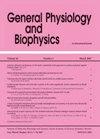Effects of curcumin and melatonin treatment in the cerebral cortex of adult rats.
IF 1.3
4区 生物学
Q4 BIOCHEMISTRY & MOLECULAR BIOLOGY
引用次数: 1
Abstract
The study investigated the effect of exogenous melatonin and (or) curcumin treatment on the cerebral cortex of adult rats. In this context, malondialdehyde (MDA), nitric oxide (NO), glutathione (GSH), superoxide dismutase (SOD), nuclear factor E2-related factor 2 (Nrf2) and SIRT2 protein expression were examined. A total of 30 Wistar albino rats involved in the study were randomly divided into five groups. Over 30 days, the control groups received phosphate-buffered saline or dimethyl sulfoxide injections, and the treatment groups received melatonin, curcumin, or a combination of melatonin and curcumin injections. In the cerebral cortex homogenates, the MDA, GSH, and sum of NO were respectively determined by the thiobarbituric acid, modified Ellman and Griess test methods. The SOD and Nrf2 levels were examined using the ELISA method and SIRT2 protein expression using the Western blot technique. The study found that both melatonin and curcumin treatments significantly reduced lipid peroxidation and SIRT2 protein expression levels (p < 0.05) and increased the Nrf2 level in the cytoplasm (p < 0.05). The study revealed that curcumin and melatonin treatments reduced MDA and SIRT2 protein expression level and increased intracellular Nrf2, GSH, and SOD in the cortex tissue. We also found that the combined melatonin and curcumin treatment produced no synergistic effect.姜黄素和褪黑素治疗对成年大鼠大脑皮层的影响。
研究了外源性褪黑素和姜黄素对成年大鼠大脑皮层的影响。在此背景下,检测丙二醛(MDA)、一氧化氮(NO)、谷胱甘肽(GSH)、超氧化物歧化酶(SOD)、核因子e2相关因子2 (Nrf2)和SIRT2蛋白的表达。将30只Wistar白化大鼠随机分为5组。在30天内,对照组接受磷酸盐缓冲盐水或二甲亚砜注射,治疗组接受褪黑素、姜黄素或褪黑素和姜黄素的联合注射。采用硫代巴比妥酸法、改良Ellman法和Griess法分别测定大鼠大脑皮层匀浆中MDA、GSH和NO的含量。ELISA法检测SOD和Nrf2水平,Western blot法检测SIRT2蛋白表达。研究发现,褪黑素和姜黄素处理均显著降低了脂质过氧化和SIRT2蛋白表达水平(p < 0.05),提高了细胞质中Nrf2水平(p < 0.05)。研究表明,姜黄素和褪黑素处理降低了MDA和SIRT2蛋白的表达水平,增加了皮质组织细胞内Nrf2、GSH和SOD的表达。我们还发现褪黑素和姜黄素联合治疗没有协同作用。
本文章由计算机程序翻译,如有差异,请以英文原文为准。
求助全文
约1分钟内获得全文
求助全文
来源期刊

General physiology and biophysics
生物-生化与分子生物学
CiteScore
2.70
自引率
0.00%
发文量
42
审稿时长
6-12 weeks
期刊介绍:
General Physiology and Biophysics is devoted to the publication of original research papers concerned with general physiology, biophysics and biochemistry at the cellular and molecular level and is published quarterly by the Institute of Molecular Physiology and Genetics, Slovak Academy of Sciences.
 求助内容:
求助内容: 应助结果提醒方式:
应助结果提醒方式:


